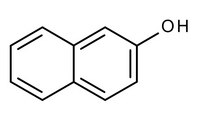822290 Sigma-Aldrich2-Naphthol
2-Naphthol for synthesis. CAS 135-19-3, molar mass 144.17 g/mol.
More>> 2-Naphthol for synthesis. CAS 135-19-3, molar mass 144.17 g/mol. Less<<Synonyms: 2-Hydroxy naphthaline
Recommended Products
Overview
| Replacement Information |
|---|
Key Spec Table
| CAS # | EC Number | Hill Formula | Molar Mass |
|---|---|---|---|
| 135-19-3 | 205-182-7 | C₁₀H₈O | 144.17 g/mol |
Products
| Catalogue Number | Packaging | Qty/Pack | |
|---|---|---|---|
| 8222900250 | Glass bottle | 250 g | |
| 8222901000 | Glass bottle | 1 kg |
| Description | |
|---|---|
| Catalogue Number | 822290 |
| Synonyms | 2-Hydroxy naphthaline |
| References |
|---|
| Product Information | |
|---|---|
| CAS number | 135-19-3 |
| EC index number | 604-007-00-5 |
| EC number | 205-182-7 |
| Hill Formula | C₁₀H₈O |
| Molar Mass | 144.17 g/mol |
| HS Code | 2907 15 10 |
| Structure formula Image | |
| Quality Level | MQ200 |
| Applications | |
|---|---|
| Application | 2-Naphthol for synthesis. CAS 135-19-3, molar mass 144.17 g/mol. |
| Biological Information |
|---|
| Dimensions |
|---|
| Materials Information |
|---|
| Toxicological Information | |
|---|---|
| LD 50 oral | LD50 Rat 1960 mg/kg |
| LD 50 dermal | LD50 Rabbit > 10000 mg/kg |
| Safety Information | |
|---|---|
| Categories of danger | harmful, dangerous for the environment |
| Product Usage Statements |
|---|
| Storage and Shipping Information | |
|---|---|
| Storage | Store below +30°C. |
| Packaging Information |
|---|
| Supplemental Information |
|---|
| Specifications | |
|---|---|
| Assay (GC, area%) | ≥ 99.0 % (a/a) |
| Melting range (lower value) | ≥ 119 °C |
| Melting range (upper value) | ≤ 122 °C |
| Identity (IR) | passes test |
| Global Trade Item Number | |
|---|---|
| Catalogue Number | GTIN |
| 8222900250 | 04022536487946 |
| 8222901000 | 04022536487953 |
Documentation
2-Naphthol SDS
| Title |
|---|
2-Naphthol Certificates of Analysis
| Product Number | Packaging | Specification | Lot Number |
|---|---|---|---|
| 8222900250 | Glass bottle | PDF Specification Document | |
| 8222901000 | Glass bottle | PDF Specification Document |










